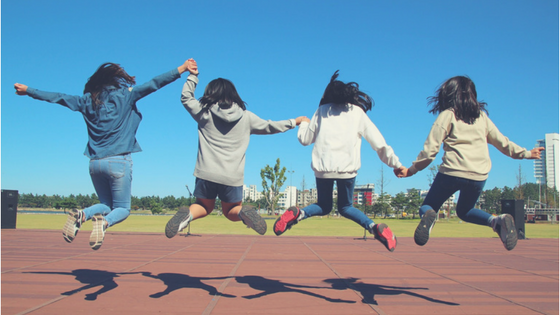The most common question that many homeschooling parents get asked by family and friends is “but what about socialisation?” There can be a stigma attached to homeschooling that children will somehow become strange antisocial creatures that have no idea how to interact with fellow human beings. This could not be farther from the truth.
Wherever people gather there is going to be interaction, there is going to be socialisation. Whether it is at the park or museum, at a cousin’s birthday party, soccer club, girl scouts, art classes, extra language lessons, or even just in the line at the shops – people talk to one another, children play and socialisation happens very naturally. Human beings have evolved in groups and it is in our nature to seek human interaction and develop connections and bonds. This process of socialisation is a core part of development and happens naturally in all our lives. The idea that this can only happen in schools is a narrow one. In fact, interaction with only other children and often only those the same age as us is rather abnormal when you think of it. Throughout life we interact (socialise) with people of all ages – our parents, siblings, cousins, aunts, grandparents and friends. We learn how to interact with one another and about social hierarchies that exist in groups of people. Basically we learn about how to be humans in a group of humans, which is what people mean when they say the dreaded words: “what about socialisation?”
Oftentimes children’s confidence gets crushed by peers at school and their desire to fit in overrides their desire to be themselves. Homeschooling children are often better socialised in the sense that they are confidently themselves and can offer ideas and opinions without the fear of ridicule. For most people, the fear of what others will think of us and what that will mean for our social standing at school kills our individuality and our belief in ourselves, our opinions and our choices. Homeschooled children are largely free from the negative impacts of bullying, peer pressure and the burden of ‘fitting in’ so they are free to speak their minds, develop their own sense of self and even wear the fun accessories or clothes that mainstream school children are too afraid do to.
Do not be worried about what homeschooling will mean for the socialisation of your child. You can ensure that they interact with others in a meaningful and conscious manner by organising play dates, visiting public spaces, joining common interest groups and participating in extra mural activities. Perhaps next time somebody expresses their deep concern to you about the socialisation of your homeschooled child, you can respond by asking them what mainstream school ‘socialisation’ is doing to their children!




